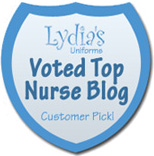What is MAO, and how come it keeps coming up in my reading of drugs?
Posted by Laura on November 9, 2009
Since there is great risk for patients on MAO inhibitors, I know I need to understand this area better. Here is what I found out:
MAO stands for monoamine oxidase. Monoamine oxidases are enzymes that catalyze the oxidation of monoamines. In other words, these enzymes oxidize or use oxygen to remove an amine group from a molecule.
Starting off we have a monamine molecule. The one above is a base (R) with 2 hydrogen and one ammonia component, plus water and oxygen. We then used MAO (the oxidase) to pull the amino group from the molecule resulting in the amino, 1 hydrogen and 1 oxygen plus the ammonia and water molecules.
Okay, so we know what MAO is. Now a MAO inhibitor would keep this from happening, right? To know why we want it to be inhibited, we need to understand why it normally happens. From what I have read, the normal MAO which happens in our body functions to monitor how many neurotransmitters get to function. If MAOs are increased, then they will be lowering the neurotransmitters activity such as serotonin, norepinephrine, epinephrine and dopamine. Depending if MAO is overworking, or under-working a patient could have depression, schizophrenia, substance abuse, ADD, and migraines.
So now I understand why having our MAOs working correctly is important. If a person is on MAO therapy, then any other drug that may also depress these neurotransmitters – or increase them, will obviously counter act with the MAO drugs and create problems.
Not only other drugs but food also. This example is given in the Tabers (p. 1485) An MAO inhibitor (MAOI) is used to treat depression and Parkinson’s disease. A tyramine-containing food such as cheese can upset this balance.
If you have a MAO excess, then you will have an increased breakdown of catecholamines in your bloodstream. Catecholamines are serotonin, dopamine, metanephrine, norepinephrine, and epinephrine. They are derived from the amino acid tyrosine.
In the Taber’s example, taking an MAO inhibitor will help to not form the tyrosine base by itself. But if you eat certain cheeses (and are using certain MAOI) you just re-establish the high load of tyrosine in your body canceling out the effect of the MAOI.
Sorry, the comment form is closed at this time.




